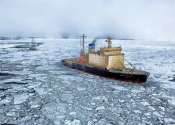Late-season Arctic research cruise reveals warm ocean temperatures, active ecosystem
Arctic researchers Jacqueline Grebmeier and Lee Cooper have been visiting the Bering and Chukchi seas off Alaska for nearly 30 years, collecting information about the biological diversity of the watery world under the sea ...









